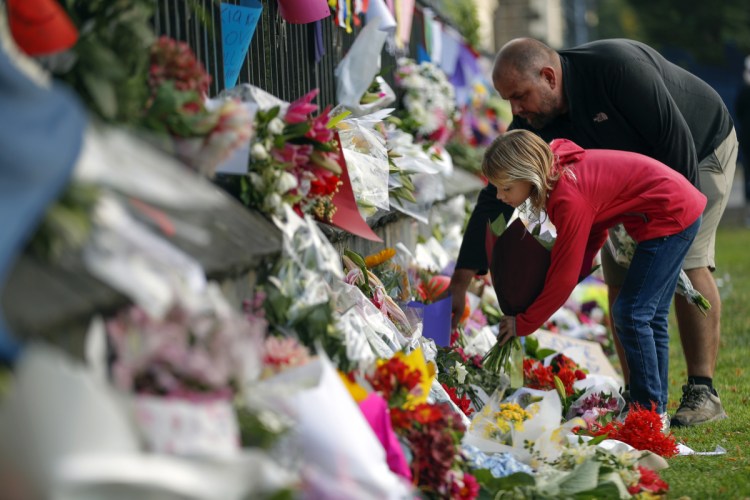WELLINGTON, New Zealand — At a city center stadium more accustomed to the raucous cheers of sports fans, tens of thousands of New Zealanders, including Prime Minister Jacinda Ardern, gathered quietly in the country’s capital Sunday evening to hear Muslim community leaders pray for peace and togetherness.
Some wore crop tops and friendship bands, others wore hijabs and many had tears in their eyes.
It was a portrait of a nation in shock and mourning after the worst terrorist attack in its modern history, facing an existential crisis about how it will and should respond.
Under debate: a total ban on semiautomatic weapons, a call to open doors to more refugees and even whether an enormously successful rugby team should change its name from the Canterbury Crusaders because of the overtones of religious intolerance.
Earlier, Ardern, who has called the massacre at two mosques one of her nation’s darkest days, reiterated that New Zealand would tighten its gun laws after Friday’s attack in the city of Christchurch, but said details still needed to be decided at cabinet level.
“There will be changes to our guns laws,” Ardern told a news conference. “We will be discussing more detailed policy elements at cabinet tomorrow.”
Ardern said formal identification of the dead was continuing, but a provisional list had been shared, one that would have been “devastating” to the families concerned. “They were loved ones, and they were New Zealanders,” she said.
Police raised the death toll to 50. A further 34 people are in Christchurch Hospital, with 12 in critical condition in intensive care, while a 4-year-old girl has been moved to a dedicated children’s hospital in Auckland, where she is also in critical condition.
“As of last night, we were able to take all of the victims from both of those scenes, and in doing so, we have located a further victim,” Mike Bush, New Zealand’s police commissioner, told a news conference.
Avowed neo-Nazi Brenton Harrison Tarrant, a 28-year-old Australian, made his first appearance in court Saturday, flashing what appeared to be a white-power hand signal, as he was escorted into the courtroom. He entered no plea to one count of murder. Officials said he would face additional charges and make another court appearance in April.
Police said evidence so far suggests Tarrant was the lone gunman.
It was Christchurch’s worst toll of death and injury since a lunchtime earthquake devastated swaths of the city and killed 185 people in 2011.
Harried coroners and pathologists raced to determine official causes of death for the unprecedented number of casualties and release victims’ bodies to their families, as Muslim burial practices require the last rites and rituals to be done as soon as possible.
Bush said a small number of bodies would be released by the coroner’s office Sunday evening, but the process was not expected to be completed until Wednesday.
“We are aware of the cultural and religious needs, so we are doing that as quickly and sensitively as possible,” he said.
Police named Tarrant as the primary suspect in what was called the deadliest attack in New Zealand history – and one of the worst cases of right-wing terrorism in years – after he allegedly stormed the two houses of worship during midday prayers and shot dozens of huddling and fleeing worshippers while live-streaming the killing over social media with a body-mounted camera.
Two others have been arrested in the course of the investigation into the shootings: 18-year-old Daniel John Burrough is expected to appear in court Monday and face charges of inciting racial hostility or ill will. Police said Sunday they do not believe he was involved in the shootings.
Another man was charged with a firearms offense but is not believed to be involved in the attacks, while a woman was released without charge. Ardern echoed police in calling these arrests “tangential” to the attacks.
The assault reverberated through the country over the weekend, with shock that such a horrific attack could have happened here, mixed with an inchoate desire to somehow make things right again.
In Christchurch, tributes to victims were visible across the city. In Linwood, the site of the second Mosque attack, trees in one street were painted with images of hearts, and occasional posters with messages of solidarity including the Islamic message of peace and greeting: Assalamu Alaikum.
At the corner of Cashel Street and Linwood Avenue, not far from the cordoned-off mosque, a small crowd gathered, mostly silent on an overcast afternoon, around a memorial composed of cards, handmade messages of condolence, and flowers.
Casting her eyes toward the armed police standing watchfully nearby, a woman in her 60s said her grief was deepened by memories of time spent with members of the Afghan community, in particular a Hajji Daoud Nabi, a much-admired elder who helped newly arrived Muslim families but died in the attack, reportedly shielding a friend.
“He was so respected, a lovely man. I’m sorry I don’t have any other words,” she said.
Send questions/comments to the editors.



Success. Please wait for the page to reload. If the page does not reload within 5 seconds, please refresh the page.
Enter your email and password to access comments.
Hi, to comment on stories you must . This profile is in addition to your subscription and website login.
Already have a commenting profile? .
Invalid username/password.
Please check your email to confirm and complete your registration.
Only subscribers are eligible to post comments. Please subscribe or login first for digital access. Here’s why.
Use the form below to reset your password. When you've submitted your account email, we will send an email with a reset code.